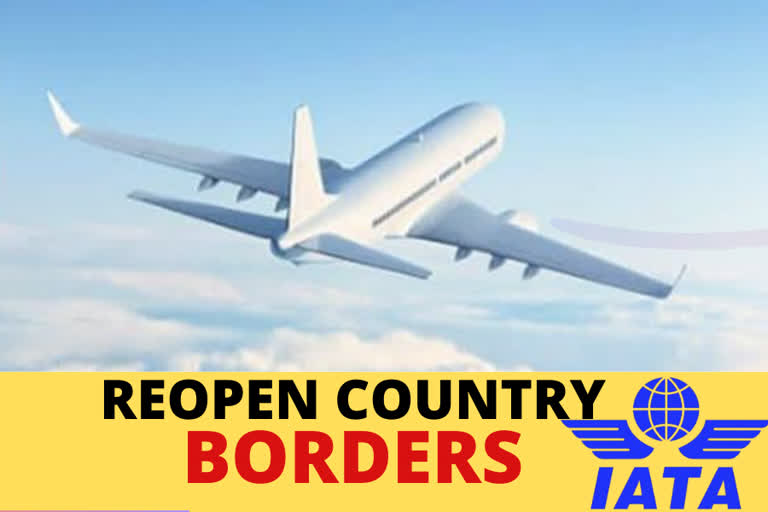New Delhi: The International Air Transport Association (IATA) on Tuesday urged countries to work together to urgently find ways to re-establish global connectivity by reopening borders and to continue with relief measures to sustain airlines during the Covid-19 crisis.
"Protecting their citizens must be the top priority of the governments. But many of the countries top leaders have been fighting the global pandemic with a view that closing borders is the only solution," said Alexander de Juniac, IATA's Director General and CEO.
-
IATA is calling on govts to work together to urgently find ways to re-establish global connectivity ✈️ and proposes a 3-point action plan to safely re-open borders. @icao
— IATA (@IATA) September 1, 2020 " class="align-text-top noRightClick twitterSection" data="
Find out more 👉 https://t.co/dz2UP2wRHJ pic.twitter.com/n3kIgxzMdQ
">IATA is calling on govts to work together to urgently find ways to re-establish global connectivity ✈️ and proposes a 3-point action plan to safely re-open borders. @icao
— IATA (@IATA) September 1, 2020
Find out more 👉 https://t.co/dz2UP2wRHJ pic.twitter.com/n3kIgxzMdQIATA is calling on govts to work together to urgently find ways to re-establish global connectivity ✈️ and proposes a 3-point action plan to safely re-open borders. @icao
— IATA (@IATA) September 1, 2020
Find out more 👉 https://t.co/dz2UP2wRHJ pic.twitter.com/n3kIgxzMdQ
"It's time for governments to work together in order to implement measures that will enable economic and social life to resume while controlling the spread of the deadly virus," he added.
He said no government wants to import Covid-19. Equally, no government should want to see the economic hardships and associated health impacts of mass unemployment. Successfully getting through this crisis requires careful risk-management with effective measures.
IATA proposes a three-point action plan for governments to safely re-open borders as follows:
- Implement the ICAO Take-off guidance universally.
- Build on the solid work of ICAO Council’s Aviation Recovery Task Force (CART) by developing an agreed common framework for states to use in coordinating the safe re-opening of their borders to aviation.
- Develop COVID-19 testing measures that will enable the re-opening of borders by reducing the risk of COVID-19 importation to what is acceptable to public health authorities with accuracy, speed and scalability that also meet the exacting requirements for incorporation into the travel process.
"As a participant in the ICAO (International Civil Aviation Organization) CART (Council's Aviation Recovery Task Force), IATA will work with governments, medical experts and testing manufacturers to accelerate proposals specifically focused on using Covid-19 testing to re-build confidence, re-open borders, re-start aviation, re-charge demand and restore jobs. There is much at stake and no time to lose," added de Juniac.
IATA urges governments to focus on relief measures in two areas:
- Financial Relief: Facing an industry loss of $84.3 billion this year, a 50% cut in revenues and high fixed costs for aircraft and labour, the financial viability of many airlines is in question. Government relief has been a critical lifeline. But what relief has been given is quickly running out. Government measures to provide additional financial buffers against failure will be critical, and these must not increase already ballooning debt levels.
- Regulatory Relief: The most urgent regulatory relief is a global waiver on the use-it-or-lose-it 80-20 slot rule. The severe uncertainty in the market means that airlines need the flexibility to adjust schedules to meet demand without the pressure of being penalized for not using allocated slots. Airlines cannot afford to fly empty planes when market demand drops. Similarly, they cannot pass up revenue when opportunities open up.
Many governments, including China, Brazil, Mexico, Singapore, Australia and New Zealand have granted waivers for the winter 2020 season (October 2020-March 2021) recognizing the severe constraints on planning schedules during this period of extreme disruption. Unfortunately, the European Commission (EC), which many governments look to for leadership on air transport policies, is under-estimating the severity of the crisis and dragging its feet.
Notably, India had suspended all scheduled all domestic and international passenger flights on March 23 due to the coronavirus pandemic. During this period, hundreds of airlines were grounded.
However, to allow gradual movement of passenger traffic, India has signed bilateral air travel arrangements or 'air bubbles' with the US, the UK, the UAE, Germany, France, Qatar and Maldives while negotiations are going on with 13 more countries.
The Vande Bharat flights have also been operating since May 6 to bring back the Indians who are stranded due to the novel coronavirus pandemic.
Meanwhile, the IATA data released on Tuesday showed that global air passenger traffic was 79.8 per cent less in July this year compared to the corresponding period of a year ago.
"This was somewhat better than the 86.6 per cent year-over-year decline recorded in June, primarily driven by domestic markets, most notably Russia and China," said the IATA.
Also Read: Govt should not be running airports and airlines; hopeful of privatising AI in 2020: Puri



